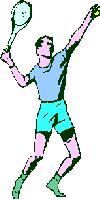The search for your groove will be easier if a few prerequisites are in place. This doesn't mean a course called Groove 101. It involves your interest level.
Enthusiasm
Playing well is a matter of focus. With the right concentration you will see the ball better, and you will notice those subtle shifts in the defense. All the little things start falling in place.
Focus isn't free, however. You need to invest a minimum level of interest, otherwise your mind just doesn't want to engage. If you have a genuine enthusiasm for playing, concentration comes naturally; without it, focus can be a struggle.
Not Sure
The good news is that you don't need to be super enthusiastic before you can experiment with a sport. Sometimes you're just not sure about playing. You may do it for the fun of competition.
Although some fall in love with a sport immediately, many more grow to like it gradually. It takes time to recognize how a sport fits you, how it stirs your sense of accomplishment, or how it physically rewards your exertions.
Comments:
If you're not sure about a sport, that's perfectly acceptable. In some ways it's good — it gives you a chance to explore. Where basketball only loosely holds your attention, tennis might fire your interest.
Exposure Power
Watching baseball on television doesn't get many juices flowing, and listening to the car race on the radio could be considered a sedative. It's difficult to get a feel for any sport by observing from a distance.
Does that mean you have to go to a live game to develop a genuine interest?
No. Well...maybe.
It's just difficult to understand the speed and power of tennis without hearing the squeak of the shoes and the whap of the racket. Going to a major league baseball park stirs a sense of majesty than doesn't come across on any screen.
Comments:
The best exposure comes from doing it yourself. The rhythm of a cross-county race, or the grace of a jump shot needs to be experienced. This means entering into the world of sweat and grunts.
If you're starting with a sport, get your shoes on and get in the game.
Easy Discipline
Let's say that a sport does catch your attention. At that point, you may be struck with how ill prepared you are to play at the level you admire. It could takes months, or even years of training. That could take serious discipline and real commitment.
Many coaches say, "That's what it's about. Suck it up, or get out."
Before you dive back to the TV listings and remote control, let's consider an alternative to the hard-nosed discipline approach.
Typically, discipline is painful because the task is large and seems impossible. To lose thirty pounds is a major undertaking; to run a five-minute mile is huge. Substantial improvement is always a challenge.
The key to making improvement easy, requiring little discipline, involves breaking the task into smaller sizes. Every task can be broken into simple steps.
For example:
Before you know it you'll have done a couple laps around the park. That's real progress, and no single step took that much effort.
Comments:
The little steps may seem whimpy, but it doesn't hurt to have an extra trick in your bag for days when you don't feel like training. Also, as a future coach, you may encounter players with a lot's of talent but little discipline.

Cheap Thrills
If you're still looking for a motivational push, remember back to the thrills.
Every once in a while you'll have a great shot. It could be that you get the arch of the ball just right, or the spin was perfect.
There's something about the purity of the perfect shot. It's almost spiritual. At the least, the crowds love it.
Enjoy it. Savor it. It's what finding your groove is about; it's what sport is about.
What's Next?
With the right training, your skill increases rapidly. A few not so well known training elements can make a big difference.
Additional Reading
The Practical Dreamer's Handbook
by Paul Edwards and Sarah Edwards. Tarcher, 2000.
* With all the motivational books available, the Edwards' easy manner and straight forward decisions stand out. There's no rah-rah, but somehow they stir my spirit.
| AWSS Home | Previous Section | Next Section |
